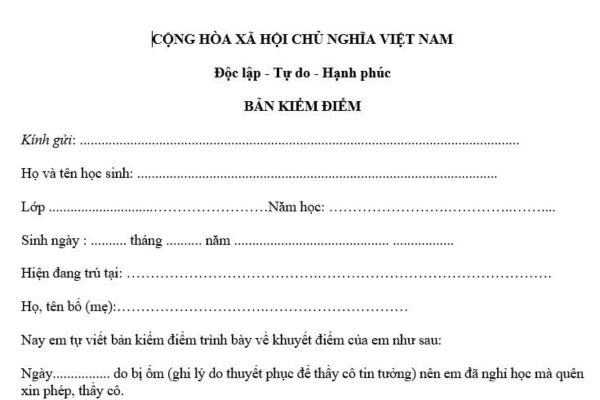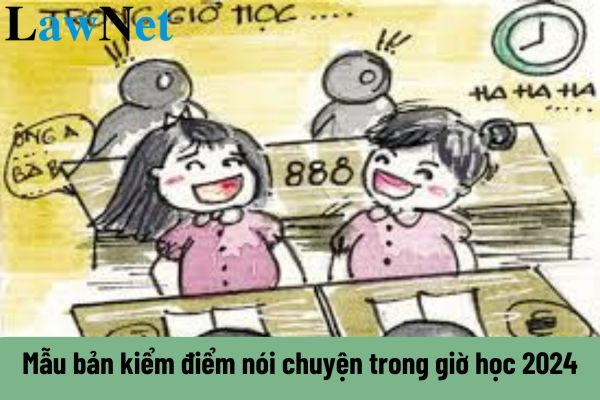In Vietnam, what are the 03 review forms applicable to students talking during class in 2024? What are the disciplinary actions against violating lower secondary school students?
In Vietnam, what are the 03 review forms applicable to students talking during class in 2024?
The review form applicable to students talking during class is a document used by students to acknowledge their violations of class rules, specifically talking during class time. This is a form of self-accountability, reflecting the student's awareness of their wrongful behavior. When writing a conduct report, students must not only describe the incident but also explain the causes and reasons leading to the behavior (if any) and acknowledge that this action disrupts the focus of peers and teachers, interrupting the shared learning process.

Review form applicable to students talking during class - Form 1 download
Review form applicable to students talking during class - Form 2 download
Review form applicable to students talking during class - Form 3 download

In Vietnam, what are the 03 review forms applicable to students talking during class in 2024? What are the disciplinary actions against violating lower secondary school students in Vietnam? (Image from the Internet)
What are the 07 prohibited acts for lower secondary school students in Vietnam?
According to Article 37 of the lower secondary school, upper secondary school and multi-level school charter issued under Circular 32/2020/TT-BGDDT, the 07 prohibited acts for lower secondary school students in Vietnam include:
1. Disrespect the dignity, honor or bodily integrity of teachers, officials and staff of their schools, other people and other students.
2. Act dishonestly in learning, examinations or admission process.
3. Buy, sell or use alcohol, tobacco, drugs, other stimulants, firecrackers or explosives.
4. Use mobile phones and other devices in class for purposes other than learning and without the teacher's permission.
5. Fight or disrupt public or school order or security.
6. Use or exchange cultural products that incite violence or contain indecent materials; use toys or play games that impede their own healthy development.
7. Students shall not commit other prohibited acts provided for by regulations of law.
What are the disciplinary actions against violating lower secondary school students in Vietnam?
Under Article 38 of the lower secondary school, upper secondary school and multi-level school charter issued under Circular 32/2020/TT-BGDDT regarding commendation and discipline:
Commendation and Discipline
1. Teachers, secondary schools and education authorities shall commend students with learning and training achievements in the following ways:
a) Commend them in front of the class or the whole school.
b) Grant them titles for students according to regulations.
c) Grant certificates and certificates of merit to students with outstanding achievements or exceptional improvement in learning or emulation movements and competition winners according to regulations and with permission from the Ministry of Education and Training.
d) Other ways to commend.
2. Students making a mistake during the learning and training process shall be corrected or disciplined in the following ways:
a) Give the student a reminder, directly support them in correcting their mistake.
b) Reprimand the student, inform the student’s parent(s) to have the parent(s) cooperate in supporting the student in correcting their mistake.
c) Suspend the student’s study at school for a definite period and take other correcting measures according to regulations from the Ministry of Education and Training.
Thus, the disciplinary actions against violating lower secondary school students in Vietnam include:
- Give the student a reminder, directly support them in correcting their mistake.
- Reprimand the student, inform the student’s parent(s) to have the parent(s) cooperate in supporting the student in correcting their mistake.
- Suspend the student’s study at school for a definite period and take other correcting measures according to regulations from the Ministry of Education and Training.
What are the rights of lower secondary school students in Vietnam?
Under Article 35 of the lower secondary school, upper secondary school and multi-level school charter issued under Circular 32/2020/TT-BGDDT, lower secondary school students in Vietnam have the following rights:
1. Receive comprehensive education with fairness, be provided with time, facilities, hygiene and safety to learn in class and self-learn at home, be informed of their education and training, and be able to use learning, cultural and sport equipment of their schools as per the law.
2. Receive respect, protection and fair and democratic treatment, complain to their schools and education authorities about decisions concerning themselves; transfer school with legitimate reason as per existing regulations; enter school before the compulsory starting age, skip a grade and study at an age higher than the compulsory attendance age according to regulations in Article 33 of this charter.
3. Participate in activities for development of their gifts in academic subjects, sports and art organized by their schools if able to.
4. Students eligible for social benefits, disadvantaged students and gifted students may receive sponsorship or other benefits as per the law.
5. Transfer school if eligible according to regulations following school transfer procedures stipulated by the Minister of Education and Training.
6. Enjoy other rights as per the law.

